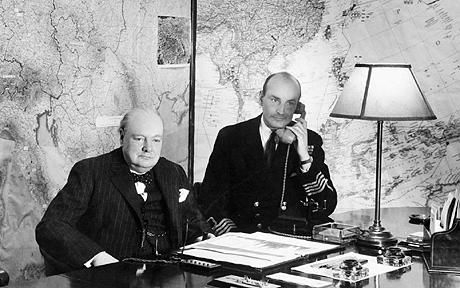Behavior 2: He Depended on a Strong and Loyal Support Staff
 On duty along with Churchill, almost around the clock, was a strong and loyal support staff. That support staff consisted of personal secretaries and typists who quickly learned their boss’ mannerisms and helped manage details for the busiest executive of the time. This support staff clearly understood what their role was—they were not advisers; they were there to make their boss’s life easier. They were successful because they knew their boss and understood his needs.
On duty along with Churchill, almost around the clock, was a strong and loyal support staff. That support staff consisted of personal secretaries and typists who quickly learned their boss’ mannerisms and helped manage details for the busiest executive of the time. This support staff clearly understood what their role was—they were not advisers; they were there to make their boss’s life easier. They were successful because they knew their boss and understood his needs.
From the start of his term as Prime Minister, Churchill insisted that every instruction, suggestion, proposal, or criticism emanating from him—and all answers in return—be in written form. He wanted to ensure clarity in communications. He understood clearly that if he did the writing himself, with his own hand, his effectiveness as a leader would be cut at least twofold. So during Churchill’s every waking hour, someone was always on hand to put what he said into writing. The typists, personal secretaries, and stenographers were always with him, even when he was bathing and dressing, so that whenever his fertile, ever-working mind came up with an idea someone immediately recorded it.
Churchill’s staff organized and managed the flow of information into and out of the Prime Minister’s office—and that office was wherever Churchill was. Whenever he moved from his quarters to the War Cabinet building or made trips to Parliament, at least two attentive aides were there to carry important papers, provide documents to him as needed, and process the flow of written information that he created as he moved. There was always a typist or a shorthand master who could take his sudden dictation without hesitation.
In his quarters when he was in London, and with him in his quarters as he traveled, were a series of file boxes that the staff used to manage the flow of written information. The system was simple and organized, and every secretary who worked with Churchill learned the system without his instruction or intervention. The staff developed the system based on suggestions from Churchill, who defined the purpose of the system and left the execution to the support team.
His personal staff became so attuned to their boss that a simple gesture or grunt was understood as a signal to act. The level of unspoken communication between Churchill and his personal staff was almost clairvoyant.
The staff understood that they were expected to be discreet regarding Churchill’s private discussions about the execution of the war. Churchill never feared that any of his support staff would take to a public forum to voice their opinions about the private conversations they witnessed. Few of these individuals maintained private diaries of the work that they did, and they understood that their role was not to inject their opinion but to be devoted and loyal instruments of execution for their boss.
How This Applies Today
As companies lighten headcounts, the first people to be cut are support and clerical personnel. While one can argue that there is too much support staff and that most managers can perform support functions just as easily, this approach discounts the value of productive administrative support. There is a fine balance between fluff and true need, and managers who discount talented administrative support often do not know how to recognize or deploy it.
Churchill recognized the need and quickly defined the mission and purpose of his personal administrative staff. He demonstrated loyalty and care for them, and they returned it in kind. In recent times, leaders have failed to define a clear mission and purpose for their administrative support, and when challenged to produce “proof of value,” have failed to defend their staffs. Once the administrative staff is lightened, the leaders may recognize their own loss of productivity, but more often they fail to see it.
E-mail, voice mail, “crack-berries,” and mobile phones introduce the Paradox of Too Much Information, which means that a leader can be inundated with unfiltered information. Successful leaders in any industry depend on gatekeepers to help filter this information. The artificial sense of urgency created by electronic assistants diminishes a leader’s capability. Electronic tools cannot translate a grunt or gesture into a series of actions like a human being can. And while some leaders can be effective with a remote assistant, the unspoken communication and verbal shorthand that is created by a live and loyal support staff can be lost in this way. There is truly something to be said for “being there.”
Look at any superior supply chain or logistics leader today, and you will see a loyal support staff standing behind that leader, helping their boss be successful. If you look closely you will see care and attention that flows in both directions. The boss cares about the support team as much as they care for the boss. Where that support from the boss is missing, loyalty is also missing.


